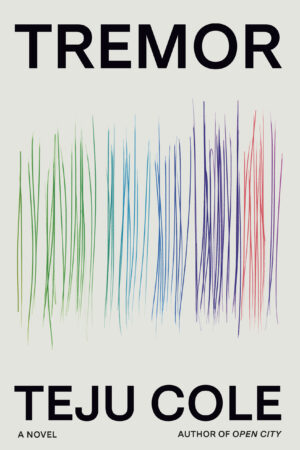Tremor
by Teju Cole
reviewed by Greg Chase
About halfway through Teju Cole’s new novel, Tremor, the central character, Tunde, delivers a lecture at Boston’s Museum of Fine Arts. Up to this point, the story has been told in the third person and has focused on Tunde’s day-to-day existence as a professor of photography at Harvard: conversations with his students, a trip to Maine to shop for antiques with his wife Sadako, their stumbling but earnest efforts to negotiate the marital tension between intimacy and autonomy. Then, in a chapter that begins, “Are we recording now? Yes? OK. Once again good evening,” readers receive the complete spoken text of Tunde’s lecture.
This moment highlights a few of the elements that make Tremor such an original, refreshing read. First, Cole comes across on the page as an extremely assured writer, someone willing to experiment with form in the service of his authorial goals, even at the risk of disorienting readers. Second, Cole is an intensely learned writer who infuses his fiction with historical detail. One of the pleasures of reading him is learning new things—not just learning to see the world through another perspective (the kind of knowledge literary fiction typically promises)—but also learning about the injustices of our shared history.
For example, Tunde devotes a good portion of his remarks at the MFA to a painting called Landscape with Burning City by the Flemish artist Herri met de Bles, an actual work held by the museum. As Tunde explains (and as the MFA’s website confirms), Hermann Göring purchased Bles’s painting in 1940 from a Jewish art dealer, who died soon thereafter while attempting to flee Amsterdam. After the war, the painting vanished from view before turning up in the possession of a dealer in New York, from whom the MFA purchased it. While descendants of the painting’s prewar owners have made a legal claim to it, the question of its rightful ownership has never been definitively resolved, and the museum’s note on its provenance closes thus: “The MFA awaits communication from the interested parties regarding their attempts to reach a neutral resolution of the ownership of the painting.”
After explaining all this in his lecture, Tunde turns to another historical atrocity, one with which he expects his audience will be less familiar: the conquest of the West African city of Benin (in the former Kingdom of Benin) by British imperial forces in 1897. In addition to indiscriminately massacring the city’s residents, the British troops took possession of countless “works of ritual and artistic significance”: ivory carvings, bronze sculptures, copper alloy plaques. Tunde compares these two cases of expropriation in order to point out that, while the MFA presents itself as deferential to legitimate claims that the Dutch Jewish community might make to ownership of the Bles painting, no comparable “invitation is appended to the provenance descriptions of the Benin works.” Reviewing these facts for his listeners, Tunde asks, “What does it mean to care about art but not about the people who made that art?”
Tremor’s explicit engagement with this question attests to a third element of its originality and power: an effort to explore, in novelistic form, the implications of far-reaching philosophical and ethical issues, particularly those having to do with the consequences of globalization. Tunde, who grew up in Lagos, describes the “political solipsism” of American attitudes toward the rest of the world. What Americans “think of as foreign is not foreign to me. Foreign is my people, every city looks to me like Lagos, any act of violence toward such places is easy to imagine as violence towards people I love.” He describes taking someone else’s picture as an exploitative act and wonders, “How is one to live in a way that does not cannibalize the lives of others, that does not reduce them to mascots, objects of fascination, mere terms in the logic of a dominant culture?” For a novelist, the question is writing about other lives in a way that avoids flattening them.
After Tunde’s lecture at the MFA comes the longest chapter in the novel, comprised of a series of brief monologues from residents of Lagos: a mother discussing her conversion from Islam to Christianity, an artist who creates temporary murals of endangered animals, a man who stages his own funeral every year. Cole makes another bold narrative choice here: Tunde does not appear at all. Instead, Cole strives to give some sense of the everyday struggles and pleasures experienced by the inhabitants of West Africa’s largest city. As these minor characters, each speaking in a unique voice, share brief anecdotes about themselves before disappearing from view, the novel offers a solution to the ethical problem it has set itself, making them known without instrumentalizing them.
Published on February 6, 2024

